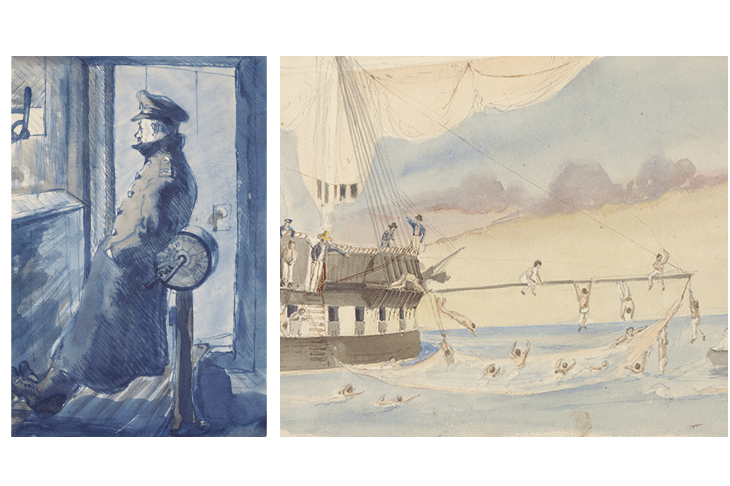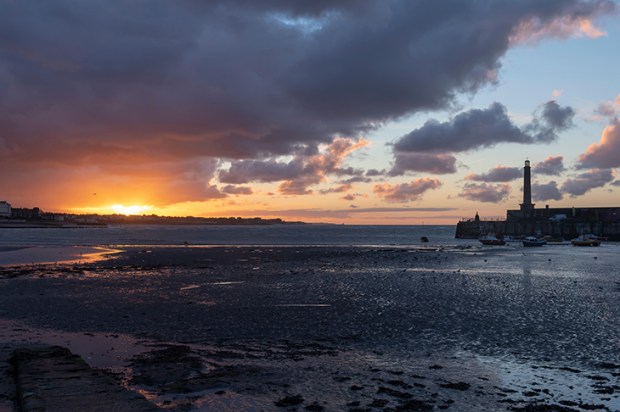Working in the Public Record Office some years ago, I ordered up the logbook of the badly damaged HMS Scylla on her return to Britain after D-Day. There was something very moving in seeing the bare navigational details noted in my uncle’s familiar hand. But then can anything be so immediate a point of contact with the past as a ship’s log as, watch by watch, the location, the wind and the weather are recorded with relentless discipline? Is there a more eloquent message than the odd water stain during a ‘fresh gale’? And if this is telling, what of the journals and diaries, sketchbooks and maps that give a graphic dimension to the mere facts?
This is the domain of The Sea Journal, a beautifully illustrated compendium of the records of captains, seamen, whalers, conservationists, Pacific Islanders, botanists, naturalists, meteorologists, adventurers, merchants, physicians, cooks, stowaways, artists and cartographers. Interspersed among details of this motley collection —mostly men, but there are a notable handful of women too — are short essays by contemporary seafarers.
Selected by Huw Lewis-Jones, sometime curator at the Scott Polar Research Institute in Cambridge and the National Maritime Museum, the entries span the globe from Arctic to Antarctic, from Pacific to Atlantic, from the 14th century to the present day. The text is dotted with some real gems: I had no idea, for example, that Beaufort of the Beaufort Scale had suffered 16 musket shots and three sabre wounds in a single action with a Spanish ship. Or, on a rather different note, that in the early 1800s there was so much contraband gin in Kent that it was used to wash windows.
Among the individuals brought together here, few will be widely known, and even the more famous are represented by excerpts that may shed a new light on them: Captain Bligh’s notes on the mutineers (Christian Fletcher was ‘subject to violent perspiration & particularly in his hands, so that he soils anything he handles’) are as fascinating as his ink-and-wash drawings of birds and fish are beautiful. But it is the more obscure characters that bring this volume to life. Charles Benson, grandson of a free black veteran of the American Revolution, went to sea in the 1850s and served as steward and cook. It was a lonely life — ‘Comfort, was there any comfort any time or anywhere at sea? I cannot really say I ever did see any,’ he confided to his journal. His record, for all the usual details of wind and weather, looks quite unlike any other; where drawings of ships or whales routinely decorate the pages of other diaries, ‘saucy actresses’, snipped from illustrated magazines, appear on Benson’s every page.
Coastal surveying was part of a naval officer’s training, so it should come as no surprise that the navy produced many competent draughtsmen; there was actually a Royal Navy prize awarded annually for the best journal kept afloat. I don’t know if the prize survived into the 20th century, but had it done so and embraced the Merchant Service, a keen contender must have been John Kingsley Cook.
Trained at the Royal Academy Schools in the 1930s, he was about to take up a post at Edinburgh College of Art when war broke out and he instead went to sea. After a spell on convoy duty he was sunk while on an operation to relieve Malta, washed ashore on the Algerian coast and taken prisoner of war until liberated in 1942, when he rejoined the service until the end of the war. His ink sketches, made on the back of bits of old navigational charts, are not just evocative vignettes of life at sea but evidence of a real artist — three brilliantly economic studies of the 2nd Engineer cutting the Chief’s hair are particularly memorable.
But if this seems a little domestic for a volume dedicated to man’s immemorial battle with the oceans, then perhaps the last word should belong to the Elizabethan sea captain John Davis. ‘Oh Lord,’ he prayed, ‘if we are bound to die, then I would rather have it in proceeding than retreating.’
Got something to add? Join the discussion and comment below.
Get 10 issues for just $10
Subscribe to The Spectator Australia today for the next 10 magazine issues, plus full online access, for just $10.
You might disagree with half of it, but you’ll enjoy reading all of it. Try your first month for free, then just $2 a week for the remainder of your first year.













Comments
Don't miss out
Join the conversation with other Spectator Australia readers. Subscribe to leave a comment.
SUBSCRIBEAlready a subscriber? Log in